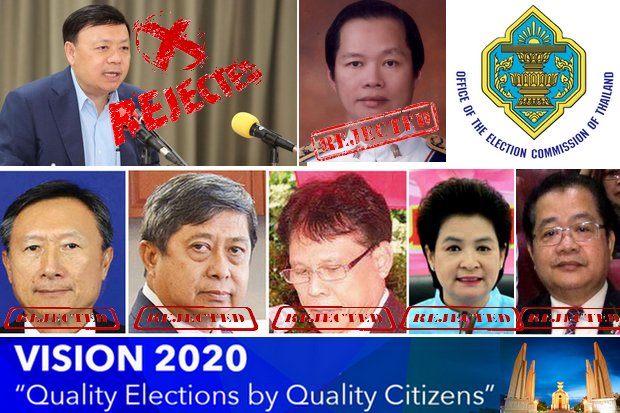
Concerns about a further delay of the general election escalated Thursday after the National Legislative Assembly (NLA) voted to reject all seven candidates chosen to be election commissioners.
The process of selecting candidates to be election regulators is now effectively back at square one and suspicions emerged that the assembly had received "an order" from the regime to veto the candidates.
The NLA met to certify the qualifications of the seven Election Commission (EC) finalists. An NLA committee chaired by Gen Ood Buangbon was responsible for checking their personal backgrounds, "moral conduct" and experience.
A closed-door meeting was held to consider a report on the candidates' qualifications submitted by the NLA panel.
After the meeting which lasted more than an hour, a secret vote was held, with a total of 248 NLA members taking part.
The candidates failed to win endorsement from the NLA after each of them gained the backing of less than half of the 248 lawmakers present at the meeting.
An NLA source revealed that the NLA had received "a clear signal" from the regime to turn down the seven candidates because the regime was concerned about claims that the Supreme Court's selection of two election commissioners was not an open process, and that it could face a legal challenge.

Under the new constitution, the Supreme Court picks two of the seven members of the Election Commission (EC) and the remaining five are picked by a panel.
Chatchai Janpraisri, chief justice of the Supreme Court, and Pakorn Mahannop, a judge in the Supreme Court, were chosen as two candidates under the Supreme Court's quota.
Previously, incumbent EC member Somchai Srisutthiyakorn said the Supreme Court's choice of Mr Chatchai and Mr Pakorn may have violated Section 12 of the organic bill on the EC which requires the Supreme Court to hold a vote for the commissioners openly.
Mr Somchai said the court sessions to choose the two candidates were held behind closed doors.
Another lawmaker said the National Council for Peace and Order (NCPO) does not want to face a problem with the Supreme Court so it decided the NLA should turn down all the candidates.
The five other commissioners chosen by the selection panel are Pracha Terat, a former deputy permanent secretary for the Interior Ministry and ex-governor of several provinces; Ruengwit Ketsuwan, a former rector of Chaiyaphum Rajabhat University; Takorn Tantasith, secretary-general of the National Broadcasting and Telecommunications Commission; Issaree Hansacharoonroj, a former rector of Rajamangala University of Technology Rattanakosin; and Chompan Sutheerachart, head of the Sutheerachart law firm.
But former Democrat Party MP Wirat Romyen suspected the NLA's rejection of the seven candidates might be a plot to extend the poll schedule.
Former Pheu Thai MP Watthana Sengphairoh shared the view, saying that those involved in choosing candidates should come out to assure that the selection process will not take long and that it would not affect the election roadmap.
However, the lawmakers insisted the rejection of the seven candidates will not cause any further delay to the election, which has likely been put off from this November to next February at the earliest due to the 90-day extension of the enforcement of the organic bill on the election of MPs.
Mr Issaree, one of the seven candidates rejected by the NLA, told the Bangkok Post he believed there was a hidden agenda behind the NLA's decision.
Legally speaking, the NLA had the right to turn down the candidates, but its reasons for the rejection were unwarranted, Mr Issaree said.
Meanwhile, another NLA source said the NLA meeting considered the "in-depth" report on the seven candidates' qualifications.
One of the reasons for the NLA to refuse to give its stamp of approval to the candidates was that while all met the qualification requirements under the constitution, several NLA members were not confident in their ability given that they were little known to the public and had no proven track record in holding elections.
As for the two candidates picked by the Supreme Court, lawmakers cast doubt on whether their selection process complied with the law, the source said.
NLA president Pornpetch Wichitcholchai, who also sat on the EC selection panel, denied vehemently that the NCPO had sent a signal for the NLA to veto the candidates.